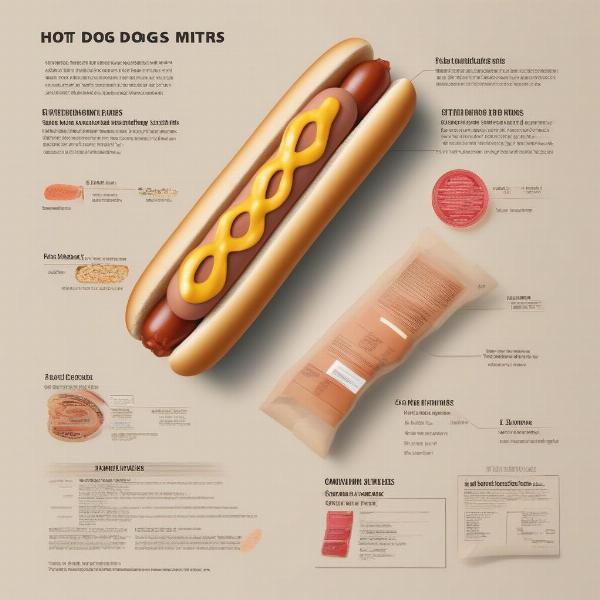Hot dog food labels can be confusing. What do all those ingredients mean, and how can you tell if a hot dog is actually a healthy treat for your dog? This article will break down the key information you need to know to make informed decisions about giving your dog hot dogs, including what to look for (and what to avoid) on the hot dog food label.
What to Look for on a Hot Dog Food Label
When considering giving your dog a hot dog, it’s crucial to understand what the label is telling you. While hot dogs aren’t ideal for regular meals, they can be an occasional treat. Here’s what to pay attention to:
- Ingredients: The ingredient list is ordered by weight, from highest to lowest. Look for hot dogs with meat as the first ingredient. Avoid those with fillers like corn syrup or artificial colors.
- Guaranteed Analysis: This section provides minimum percentages of crude protein, fat, fiber, and moisture. Higher protein is generally better, but balance is key.
- Nutritional Adequacy Statement: This statement indicates whether the product is “complete and balanced” for a particular life stage (e.g., adult maintenance, growth). Hot dogs are rarely complete and balanced, so they should only be occasional treats, not meal replacements.
- Sodium Content: Hot dogs are often high in sodium, which can be harmful to dogs in large quantities. Choose lower-sodium options when possible.
 Hot Dog Ingredients Label
Hot Dog Ingredients Label
Is it Safe to Give My Dog a Hot Dog Every Day?
No, it’s not recommended to give your dog a hot dog every day. While a small piece occasionally won’t hurt most healthy dogs, hot dogs are processed and lack the essential nutrients for a balanced canine diet. Regular consumption can lead to obesity, pancreatitis, and other health issues due to high fat and sodium content.
Potential Health Risks of Frequent Hot Dog Consumption
Feeding your dog hot dogs frequently can increase the risk of:
- Pancreatitis: The high fat content can trigger inflammation of the pancreas.
- Obesity: Excess calories from hot dogs contribute to weight gain.
- Sodium Toxicity: High sodium levels can lead to dehydration, vomiting, and even seizures.
- Gastrointestinal Upset: Some dogs may experience digestive issues after eating hot dogs.
Healthy Alternatives to Hot Dogs for Dogs
If you’re looking for healthy and delicious treats for your dog, consider these alternatives:
- Small pieces of cooked lean meat (chicken, turkey, beef)
- Fruits and vegetables (carrots, apples, blueberries – always check for toxicity)
- treats for allergic dogs specifically formulated for sensitive dogs
- Commercially available dog treats made with wholesome ingredients
Can Puppies Eat Hot Dogs?
Puppies have sensitive stomachs and require a nutrient-rich diet for proper growth. Hot dogs are not recommended for puppies due to their high fat and sodium content. Focus on feeding your puppy a high-quality puppy food to ensure they receive all the necessary nutrients.
Conclusion
While a small piece of hot dog can be an occasional treat for your dog, it’s important to understand the information on the hot dog food label and choose wisely. Prioritize your dog’s health by offering a balanced diet and opting for healthier treat alternatives. Remember, moderation is key when it comes to indulging your furry friend.
FAQ
- Can I give my dog a hot dog every day? No, hot dogs should only be given occasionally due to their high fat and sodium content.
- What should I look for on a hot dog food label? Check the ingredients, guaranteed analysis, sodium content, and nutritional adequacy statement.
- Are there healthier alternatives to hot dogs for dogs? Yes, consider small pieces of cooked lean meat, fruits, vegetables, or commercially available healthy dog treats.
- Can puppies eat hot dogs? No, hot dogs are not recommended for puppies.
- What are the risks of feeding my dog too many hot dogs? Risks include pancreatitis, obesity, sodium toxicity, and gastrointestinal upset.
- Why are hot dogs bad for dogs? Hot dogs are highly processed, often high in sodium and fat, and lack essential nutrients.
- What should I do if my dog ate too many hot dogs? Contact your veterinarian immediately if you suspect your dog has consumed a harmful amount of hot dogs.
ILM Dog is your trusted resource for all things dog-related. We offer expert advice on dog breeds, health, training, nutrition, grooming, and much more. Whether you’re a seasoned dog owner or just starting your journey, ILM Dog is here to support you. Contact us at [email protected] or +44 20-3965-8624 for expert guidance tailored to your dog’s specific needs.